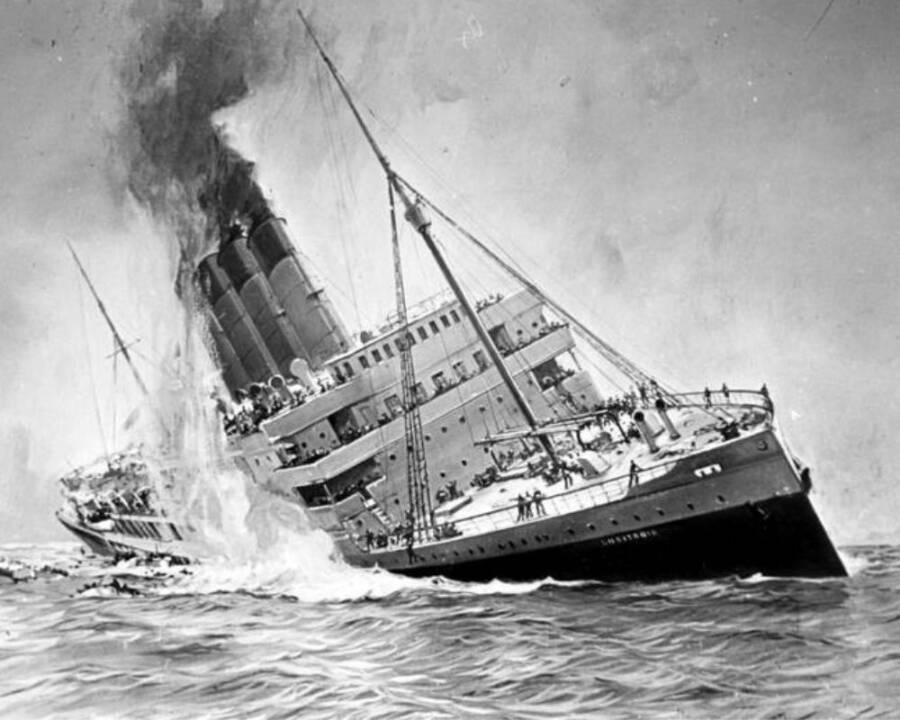What happened on this day in history: H. H. Holmes is hanged for his crimes in 1896, the RMS Lusitania sinks in 1915, and more.
1824: Beethoven Debuts Symphony No. 9

Wikimedia CommonsAn 1820 portrait of Beethoven by Joseph Karl Stieler.
Beethoven debuts his final symphony at Theater am Kärntnertor in Vienna. The composer had lost nearly all of his hearing by 1814, years before he even started writing Symphony No. 9. Nevertheless, this iconic work is considered one of the greatest pieces of music in history. He “conducted” the first performance on stage, though the musicians took cues from the actual conductor Michael Umlauf instead. The symphony received a standing ovation — which Beethoven only realized after one of the singers turned him around to see it, as he couldn’t hear the applause.
1896: H. H. Holmes Is Hanged
American serial killer H. H. Holmes is hanged in Philadelphia after his conviction for the murder of Benjamin Pitezel. While he was executed for just one murder, Holmes confessed to killing 27 people between 1891 and 1894, many of them in his Chicago “Murder Castle.” In his confession, he stated, “I was born with the devil in me. I could not help the fact that I was a murderer, no more than a poet can help the inspiration to sing.”
Listen above to the History Uncovered podcast, episode 98: The Truth Behind The Legend Of H. H. Holmes And His ‘Murder Castle,’ also available on Apple and Spotify.
1915: The Sinking Of The Lusitania

Wikimedia CommonsAn illustration of the sinking of the RMS Lusitania.
The RMS Lusitania sinks after it is torpedoed by a German U-boat during World War I. The British ship was transporting civilians from New York to Liverpool when it was hit, and 1,195 people on board were killed, including 128 Americans. The attack angered the neutral United States, and though President Woodrow Wilson chose not to enter the conflict in response, the incident did contribute to America’s eventual declaration of war in 1917.
1919: Eva Perón, First Spouse Of Argentina, Is Born
Eva Perón, the first spouse of Argentina, is born Los Toldos, Argentina. While studying to be an actress in Buenos Aires, Eva met Colonel Juan Perón and married him a year later. Juan Perón was elected as Argentina’s president in 1946, and Eva suddenly found herself in Argentina’s political world. As the First Spouse, Eva began multiple campaigns meant to bolster social services in Argentina. She also worked hard to legalize women’s suffrage and even ran for vice president. Although Eva died from cervical cancer at the age of 33, her legacy was long lasting in Argentina long after her death.
1960: Leonid Brezhnev Becomes General Secretary Of The U.S.S.R.
Leonid Brezhnev becomes the Chairman of the Presidium of the Supreme Soviet, the equivalent of president of the U.S.S.R. Brezhnev had been a close associate of his predecessor Nikita Khrushchev for decades, and when Khrushchev became the leader of the Communist Party of the Soviet Union after Joseph Stalin’s death, he named Brezhnev president — a largely symbolic role.
However, when Khrushchev was removed from power in 1964, Brezhnev took his place as leader of the Soviet Union. Today, Brezhnev’s tenure is widely remembered both for a successful easing of Cold War tensions with the United States but also for economic stagnation and a slowing of technological development at home.



